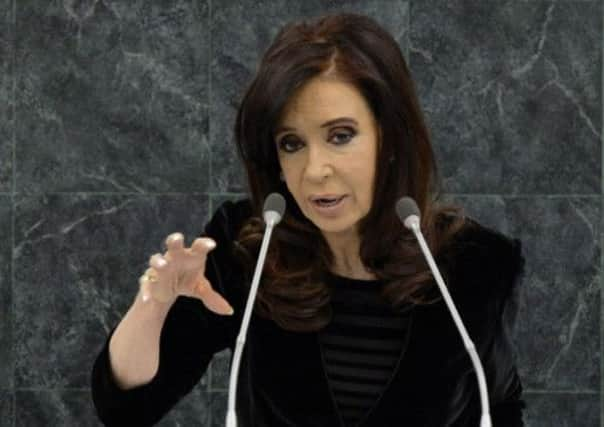Argentine president recovering after brain surgery


She was diagnosed with the life-threatening condition on Saturday. Despite treatment, she is unlikely to be able to campaign ahead of key mid-term elections amid a bitter court battle with international creditors.
Following the surgery, spokesman Alfredo Scoccimarro said: “She is in a very good mood.”
Advertisement
Hide AdAdvertisement
Hide AdMs Fernandez’s condition, described as a subdural haematoma, came from hitting her head in a fall in August. The operation involved draining blood that had pooled between the brain and the skull.
The president, known for micro-managing her cabinet, is likely to pick up the reins of state as soon as she can, even if from a hospital bed. Vice-president Amado Boudou cut short a planned visit to Brazil and France to return to Argentina at the weekend to take over Ms Fernandez’s public duties.
On Saturday Ms Fernandez, 60, was told to rest for a month but on Monday plans for surgery were announced after she complained of tingling in her left arm.
Supporters, some carrying signs that said “Hang In There Cristina” and “The Country Is With You” gathered outside the Fundacion Favaloro hospital yesterday morning, where the surgery was carried out.
“She sends greeting to all of you and would like to thank you and her medical team,” Mr Scoccimarro said from the hospital steps. While messages of sympathy poured in, critics questioned the secrecy surrounding the health of Ms Fernandez. Her condition was announced in a three-paragraph statement late on Saturday after she spent more than nine hours in hospital. It said she suffered cranial trauma on 12 August, but gave no details of how the injury happened.
Argentina’s constitution provides for, but does not require, a formal transfer of power in case of extended health problems, said Daniel Sabsay, a constitutional lawyer. A full medical leave would require congressional approval, but short of that “she alone decides, according to the problem she faces and her doctors’ advice, if she needs to delegate some powers to the vice-president”.
The haematoma appeared at a sensitive time for the administration. Argentines are increasingly unhappy about double-digit inflation and government-imposed currency controls that have clamped down on access to American dollars as part of an effort to halt capital flight.
Her policies promote growth at the cost of consumer prices increases, said to be running by private economists at 25 per cent a year, one of the highest inflation rates in the world. When she became ill on Saturday, Ms Fernandez was in full campaign mode, making speeches on behalf of allies running in the 27 October mid-term primary, an election that will determine whether her coalition keeps control of Congress during her final two years as leader.
Advertisement
Hide AdAdvertisement
Hide AdMs Fernandez, first elected in 2007 and re-elected in 2011 on promises of greater state intervention in Latin America’s third largest economy, also is embroiled in a legal battle with bond investors who declined to participate in Argentina’s 2005 and 2010 debt restructurings and are suing for full repayment of the $1.3 billion owed.
The US Supreme Court on Monday declined to hear a preliminary appeal filed by Argentina in the case, which could go on for another year after more than a decade of bouncing around the US federal courts.